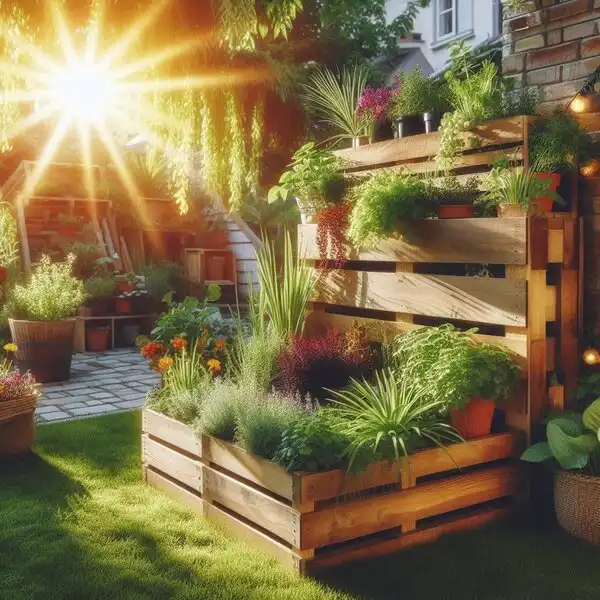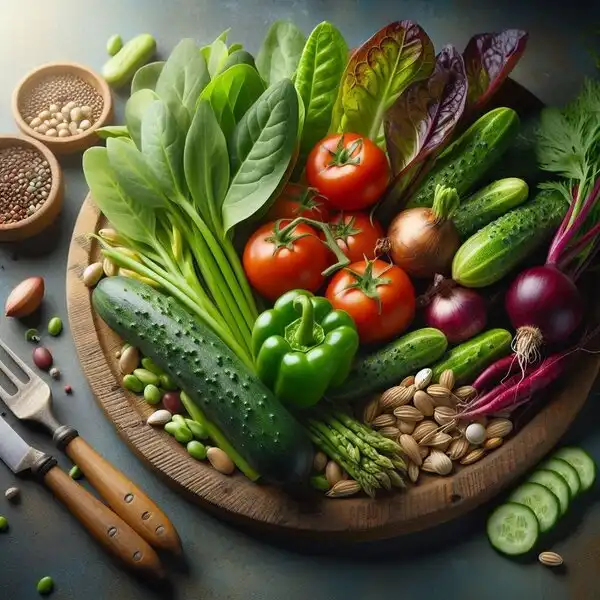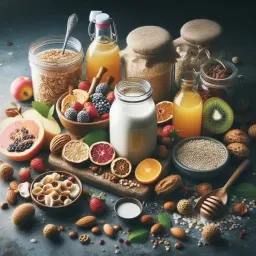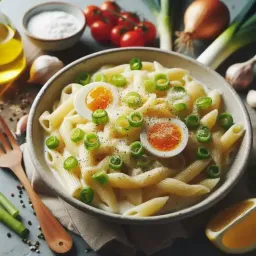Choosing the Best Vegetable Garden Seeds for a Bountiful Harvest
As a gardener, you understand the excitement of watching your seeds sprout and grow into a thriving vegetable garden. However, the journey to a bountiful harvest begins with a crucial first step: selecting the right seeds. In this article, we'll delve into the world of vegetable garden seeds, exploring the importance of quality seeds, key characteristics to look for, and debunking common misconceptions along the way.

Understanding the Importance of Quality Seeds
High-quality seeds are the foundation of a successful vegetable garden. The quality of your seeds directly impacts plant growth, yield, and overall garden performance. Seeds that are fresh, disease-free, and suitable for your climate will give your plants a strong start, increasing the chances of a bountiful harvest.
On the other hand, low-quality seeds can lead to weak, disease-prone plants that struggle to thrive. This can result in reduced yields, increased maintenance, and a higher risk of pests and diseases. By investing in high-quality seeds, you're setting yourself up for success and minimizing the risk of common gardening problems.
Identifying Key Characteristics of Top-Rated Vegetable Seeds
When selecting seeds, there are several key characteristics to consider. These include:
- Disease resistance: Look for seeds that are resistant to common diseases in your region, such as powdery mildew or fusarium wilt.
- Climate adaptability: Choose seeds that are suitable for your local climate and temperature range.
- Growth rate: Consider the growth rate of the variety, as some seeds may mature more quickly than others.
- Seed certification and quality control: Opt for seeds that have been certified by reputable organizations, such as the USDA or the International Seed Federation.
By considering these factors, you can increase the chances of selecting seeds that will thrive in your garden.
Top 5 Essential Vegetable Crops for Every Garden
When it comes to choosing the right vegetable crops for your garden, there are a few essentials that are suitable for diverse climates and garden types. These include:
- Tomatoes: A classic favorite, tomatoes are easy to grow and produce a high yield.
- Cucumbers: These versatile vegetables are perfect for snacking, salads, and pickling.
- Carrots: A cool-season crop, carrots are easy to grow and rich in nutrients.
- Radishes: Quick-growing and easy to care for, radishes add a spicy kick to salads and sandwiches.
- Leaf lettuce: A hardy, cool-season crop, leaf lettuce is perfect for salads and sandwiches.
When selecting varieties, consider factors such as growth rate, disease resistance, and climate adaptability to ensure the best results.
Debunking Common Misconceptions About Vegetable Seeds
There are several common misconceptions about vegetable seeds that can impact your gardening success. Let's set the record straight:
Hybrid vs. heirloom seeds: While hybrid seeds are often bred for specific traits, heirloom seeds can offer unique flavors and textures. Both types have their advantages and disadvantages, and the best choice depends on your personal preferences and gardening goals.
Seed aging and storage: Proper storage and handling can significantly impact seed germination rates. Store seeds in a cool, dry place, and check expiration dates to ensure optimal results.
By understanding the importance of quality seeds, identifying key characteristics, and debunking common misconceptions, you'll be well on your way to selecting the best vegetable garden seeds for a bountiful harvest.
Stay tuned for the next section, where we'll explore vegetable seed selection for specific growing conditions, including container gardens, climate-specific gardens, and soil types.
Vegetable Seed Selection for Specific Growing Conditions
When it comes to selecting the best vegetable seeds for your garden, it's essential to consider the specific growing conditions you'll be working with. Different seeds thrive in different environments, and choosing the right ones can make all the difference in the success of your harvest. In this section, we'll explore the unique challenges and opportunities of growing vegetables in containers, extreme climates, and diverse soil types.
Seeds for Container Gardens: Compact Varieties for Small Spaces
Container gardens offer a convenient and versatile way to grow vegetables, even in small spaces. However, they present unique challenges, such as limited soil volume and potentially intense sunlight. To succeed in container gardens, you'll want to focus on compact and dwarf varieties that are specifically bred for small spaces.
Some popular compact varieties for container gardens include:
- Tomatoes: 'Patio', 'Tiny Tim', and 'Red Robin' are all compact varieties that produce high yields in small spaces.
- Peppers: 'Thai Hot', 'Bird's Eye', and 'Sweet Pepper' are compact and produce plenty of fruit.
- Cucumbers: 'Bush Pickle', 'Salad Bush', and 'Marketmore' are all compact varieties suitable for containers.
When growing in containers, be sure to:
- Use a high-quality potting mix specifically designed for containers.
- Provide adequate drainage to prevent waterlogged soil.
- Fertilize regularly, as container gardens can quickly deplete nutrients.
Seeds for Climate-Specific Gardens: Adapting to Heat, Cold, and Everything In-Between
Vegetable seeds can be finicky about climate, and selecting the right ones for your region's specific conditions is crucial. Whether you're dealing with scorching heat, bitter cold, or everything in between, there are seeds that thrive in these environments.
For hot climates:
- Okra: 'Clemson Spineless' and 'Red Burgundy' are heat-tolerant and produce high yields.
- Peppers: 'Jalapeño', ' Anaheim', and 'Habanero' love the heat and produce plenty of fruit.
- Tomatoes: 'Heat Wave', 'Southern Star', and 'Patio' are all heat-tolerant and produce high yields.
For cold climates:
- Broccoli: 'Deep Purple' and 'Waltham 29' are cold-hardy and produce high yields.
- Brussels Sprouts: 'Long Island Improved' and 'Jade Cross' are cold-tolerant and produce high yields.
- Kale: 'Russian Red' and 'Lacinato' are cold-hardy and produce high yields.
When growing in extreme climates, be sure to:
- Choose varieties that are specifically bred for your climate zone.
- Provide adequate protection from extreme temperatures, such as shade cloth or cold frames.
- Monitor weather forecasts and adjust your planting schedule accordingly.
Seeds for Soil Types: Matching Seeds to Your Garden's Soil Profile
Soil type can greatly impact the success of your vegetable garden, and selecting seeds that thrive in your specific soil type is essential. Whether you have clay, sandy, or loamy soil, there are seeds that are optimized for each type.
For clay soil:
- Carrots: 'Little Finger' and 'Danver's Half-Long' are compact and do well in clay soil.
- Beets: 'Detroit Dark Red' and 'Chioggia' are compact and produce high yields in clay soil.
- Radishes: 'Cherry Belle' and 'French Breakfast' are quick-growing and do well in clay soil.
For sandy soil:
- Cucumbers: 'Slicing', 'Pickling', and 'English' are all well-suited for sandy soil.
- Squash: 'Acorn', 'Butternut', and 'Zucchini' are all compact and produce high yields in sandy soil.
- Tomatoes: 'Patio', 'Tiny Tim', and 'Red Robin' are all compact and do well in sandy soil.
When growing in diverse soil types, be sure to:
- Test your soil pH and adjust it accordingly.
- Amend your soil with organic matter, such as compost or manure, to improve its structure.
- Choose varieties that are tolerant of your soil type's specific challenges.
By selecting seeds that are optimized for your specific growing conditions, you'll be well on your way to a bountiful harvest. Remember to consider factors such as climate, soil type, and container size when choosing the best seeds for your garden.
Vegetable Seed Reviews and Recommendations
With so many vegetable seed brands and options available, it can be overwhelming to choose the right ones for your garden. In this section, we'll delve into the world of vegetable seed reviews and recommendations, helping you make informed decisions for a successful harvest.
Top 10 Vegetable Seed Brands for Quality and Consistency
When it comes to selecting the best vegetable seeds, it's essential to choose a reputable brand that offers high-quality products. After researching and comparing various brands, we've compiled a list of the top 10 vegetable seed brands that stand out for their quality and consistency.
1. Burpee Seeds: With over 140 years of experience, Burpee Seeds is a household name in the gardening industry. They offer a wide range of vegetable seeds, including heirloom, organic, and hybrid options.
2. Seed Savers Exchange: As a non-profit organization, Seed Savers Exchange is dedicated to preserving and sharing heirloom seeds. They offer a vast collection of unique and rare vegetable varieties.
3. High Mowing Seeds: High Mowing Seeds is a popular choice among organic gardeners, offering a diverse selection of certified organic and non-GMO vegetable seeds.
4. Baker Creek Heirloom Seeds: With over 2,000 varieties of vegetable seeds, Baker Creek Heirloom Seeds is a go-to destination for gardeners seeking rare and unusual options.
5. Renee's Garden Seeds: Renee's Garden Seeds offers a wide range of vegetable seeds, including hybrid, organic, and heirloom options. They're known for their high-quality products and excellent customer service.
6. Botanical Interests: Botanical Interests is a popular brand among gardeners, offering a diverse selection of vegetable seeds, including certified organic and heirloom options.
7. Johnny's Selected Seeds: Johnny's Selected Seeds is a well-respected brand in the gardening industry, offering a wide range of vegetable seeds, including hybrid, organic, and heirloom options.
8. Territorial Seed Company: Territorial Seed Company is a family-owned business that offers a diverse selection of vegetable seeds, including certified organic and heirloom options.
9. Fedco Seeds: Fedco Seeds is a cooperative business that offers a wide range of vegetable seeds, including certified organic and heirloom options.
10. Seeds of Change: Seeds of Change is a popular brand among organic gardeners, offering a diverse selection of certified organic and non-GMO vegetable seeds.
In our review, we considered factors such as seed quality, customer service, pricing, and variety selection. While each brand has its strengths and weaknesses, these top 10 brands consistently deliver high-quality products and excellent customer service.
Best Vegetable Seeds for Beginners: Easy-to-Grow Varieties for New Gardeners
If you're new to vegetable gardening, it's essential to start with easy-to-grow varieties that are forgiving of common mistakes. Here are some top picks for beginner-friendly vegetable seeds:
- Tomatoes: Look for compact or dwarf varieties like 'Patio' or 'Tiny Tim'.
- Cucumbers: 'Slicing' or 'Pickling' varieties are easy to grow and require minimal care.
- Zucchini: This popular summer squash is easy to grow and can be harvested in as little as 35 days.
- Carrots: 'Little Finger' or 'Danver's Half-Long' are excellent choices for beginners, requiring minimal care and maintenance.
- Radishes: These fast-growing roots can be harvested in as little as 20 days and require minimal care.
When selecting seeds for beginners, look for varieties that are resistant to common diseases and pests, and have a shorter growth period. These factors will help ensure a successful harvest and build confidence in your gardening skills.
Specialty Seeds for Unique Growing Needs: Heirloom, Organic, and Hybrid Options
Beyond the basics, there are many specialty seed options available for gardeners with unique growing needs. Here, we'll explore the benefits and drawbacks of heirloom, organic, and hybrid seeds:
Heirloom Seeds: Heirloom seeds are open-pollinated varieties that have been saved and handed down through generations. They offer unique flavors, textures, and characteristics, but may require more care and maintenance.
Organic Seeds: Organic seeds are grown without the use of synthetic pesticides, herbicides, or fertilizers. They're an excellent choice for gardeners who prioritize environmental sustainability and human health.
Hybrid Seeds: Hybrid seeds are the result of crossing two parent lines to produce a new variety with desirable traits. They often offer improved disease resistance, higher yields, and better adaptability to environmental conditions.
When selecting specialty seeds, consider your specific growing needs and priorities. Whether you're looking for unique flavors, environmental sustainability, or improved yields, there's a specialty seed option available to meet your needs.
Putting It All Together: Creating a Thriving Vegetable Garden
Now that you've learned about the importance of selecting high-quality seeds, identified key characteristics of top-rated seeds, and explored the best options for specific growing conditions, it's time to put it all together. In this section, we'll discuss how to create a comprehensive garden plan that integrates the right seeds for success.
Creating a Garden Plan: Integrating the Right Seeds for Success
A well-planned garden is essential for achieving a bountiful harvest. When creating your garden plan, consider the following factors to ensure you're selecting the right seeds for your specific needs:
- Soil Type: Choose seeds that are optimized for your soil type, whether it's clay, sandy, or loamy.
- Climate: Select seeds that are suitable for your local climate, including heat, cold, and everything in between.
- Space: Consider compact or dwarf varieties for small spaces, and larger varieties for bigger plots.
- Growth Rate: Balance your garden with a mix of fast-growing and slow-growing seeds to ensure a continuous harvest.
- Disease Resistance: Choose seeds with built-in disease resistance to minimize the risk of pests and diseases.
By considering these factors, you'll be able to create a diverse and balanced garden that thrives throughout the growing season.
Optimizing Seed Selection for a Balanced and Diverse Garden
A successful vegetable garden is all about balance and diversity. Here are some tips for optimizing your seed selection:
- Grow a mix of cool-season and warm-season crops: This will ensure a continuous harvest throughout the year.
- Incorporate companion planting: Pair seeds that benefit from each other's growth, such as marigolds and tomatoes.
- Include a variety of colors: Different colored vegetables offer unique nutrients and antioxidants, making for a healthier and more nutritious harvest.
- Experiment with new varieties: Try new and unusual seeds to add diversity to your garden and prevent boredom.
Start Your Vegetable Gardening Journey Today
Selecting the best vegetable garden seeds is just the beginning. With the right seeds and a comprehensive garden plan, you'll be well on your way to growing a thriving and bountiful harvest. Remember, the key to success lies in understanding your specific growing conditions, choosing high-quality seeds, and creating a balanced and diverse garden.
So, what are you waiting for? Start your vegetable gardening journey today and discover the joy of growing your own delicious and nutritious food. Happy gardening!

 Emma
Emma

